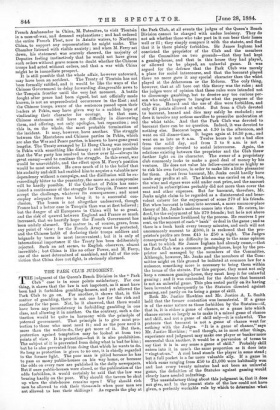THE NEWS FROM CHINA.
THE news of the week from China may prove exceedingly serious. It was reported on Thursday that 4,000 Chinese regulars had attacked a French force on its way to Langson, and had inflicted on them a loss in killed and wounded of fifty-four men and officers. As Langson is within the boundaries of Tonquin fixed by the new Treaty of Tientsin, and as China had in that treaty specifically pro- mised to withdraw her troops from the entire territory, the report was in London generally disbelieved. Some nondescript bands, it was said, half brigands and half patriots, had at- tacked the French, as similar bands on the Indian frontier have frequently attacked the English, and would be put down without either difficulty or loss of time. The Parisians, however, who were acquainted with the character of General Millot, were obviously uneasy. He is by no means the kind of man to exag- gerate an eineute,he is perfectly aware that his Government does not desire a war with China, and his personal interest is strong in representing his success in Tonquin as complete. Such a telegram from such a man implied some serious occurrence,—it might be a new revelation of the policy of Pekin. On Thurs- day afternoon, therefore, M. Ferry was questioned in the Chamber ; and his answer showed that whatever the actual truth, General Millot's despatch had deeply impressed him with the gravity of the situation. The facts, he stated, had been accurately reported. French troops had actually been attacked by Chinese regulars. He had consequently stopped the de- parture of the regiments from Tonquin ; had telegraphed to the French Ambassador in China, M. Patenotre, to visit Tientsin in a man-of-war, and demand explanations ; and had ordered the entire French Fleet, now in Asiatic waters, to Northern China, to support any representation he might make. The Chamber listened with visible anxiety ; and when M. Ferry sat down, his statement was scarcely cheered, the majority of Deputies feeling instinctively that he would not have given such orders without grave reason to doubt whether the Chinese troops had acted without orders, and that a war with China might be in immediate prospect.
It is still possible that the whole affair, however untoward, may have been an accident. The Treaty of Tientsin has not been formally' ratified, and it would be like the ways of the Chinese Government to delay forwarding disagreeable news to the Tonquin frontier until the very last moment. A battle fought after peace had been signed, but not officially made known, is not an unprecedented occurrence in the East ; and the Chinese troops, aware of the sentences passed upon their leaders at Pekin, may have given way to a sudden hope of vindicating their character for courage. In that case, Chinese statesmen will have no difficulty in disavowing them, and offering, not only apologies, but reparation ; and this is, on the whole, the most probable termination of the incident. It may, however, have another. The struggle between the Mantcheou and Chinese parties in Pekin, which are also the War and Peace parties, is known to have gone great lengths. The Treaty arranged by Li Hung Chang was received in Pekin with something like dismay ; and it is quite possible that the War party has resolved to throw over Li—always its great enemy—and to continue the struggle. In this event, war would be unavoidable, and the effect upon M. Ferry's position would be most serious. Be owes much of it to the belief that his audacity and skill had enabled him to acquire a valuable new dependency without a campaign, and the disillusion will be ex- exceedingly bitter to the peasantry, the more so, as compromise will be hardly possible. If the Cabinet of Pekin has sanc- tioned a continuance of the struggle for Tonquin, France must accept the challenge, whatever its consequences ; and must employ adequate force to bring it to a successful con- clusion. The lesson is not altogether undeserved, though France had a better case in Tonquin than was at first believed ; but the danger of all Europeans in China will be so great, and the risk of quarrel between England and France so much increased, that we heartily hope the French Government has been unduly alarmed. The matter is, of course, grave, from any point of view ; for the French Army must be protected, and the Chinese habit of declaring their troops soldiers and brigands by turns is most inconvenient ; but it is only of international importance if the Treaty has been deliberately rejected. Such an act seems, to English observers, almost incredible ; but China is like no other Power, and M. Ferry, one of the most determined of mankind, and full of the con- viction that China does not fight, is obviously alarmed.



































 Previous page
Previous page